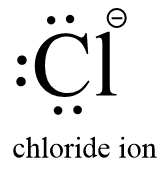Question
Question: Can \( Cl \) act as a Lewis base?...
Can Cl act as a Lewis base?
Solution
A species which has a tendency to accept an electron pair i.e., either electron deficient (positively charged) species or the atom with vacant d-orbitals is known as Lewis acid whereas a species which has a tendency to donate an electron pair i.e., either electron rich (negatively charged) species or the atom with lone pair of electrons is known as Lewis base.
Complete answer:
Chlorine is a chemical element which belongs to the halogen family and has atomic number 17 . Its electronic configuration can be represented as follows:
Cl=1s22s22p63s23p5
As the valence shell of chlorine consists of seven electrons, so it generally exists as a chloride ion by gaining an electron pair while combining with other elements. Hence, it is considered as an electron rich species because it consists of three lone pairs of electrons along with a negative charge. It is represented as follows:

Due to the presence of a negative charge, it has a tendency to donate electrons and thus act as a Lewis base. Due to its high electronegativity, it is a poor electron donor and hence, it is a weak Lewis base.
Note:
It is important to note that the Lewis acids i.e., positively charged species are also known as electrophiles which means electron loving substances whereas the Lewis bases i.e., negatively charged species are also known as nucleophiles which means nucleus or proton loving species. Although there is a minute difference between base and a nucleophile i.e., stronger bases have the property to form stronger bonds between atoms while stronger nucleophiles have tendency to trigger the speed of reaction.
